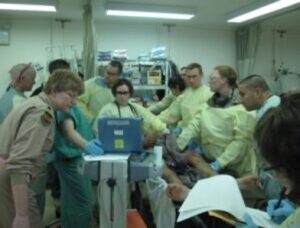
“We left things in a better state than when we got there”
Mark Antonacci, MD, FACEP
Explore This Issue
ACEP Now: Vol 41 – No 01 – January 2022I deployed several times during my time on active duty, but my most memorable deployment was in 2010 as part of an Embedded Training Team based out of Forward Operating Base Lindsey in Kandahar Province. My team worked with the Afghan Army doctors, nurses, medics, and ancillary staff on a daily basis in their facility. It was (and likely still is) the Wild West of Afghanistan. Processing the events of the U.S. withdrawal over the last few months has been difficult. I just try to focus on the fact that we left things in a better state than when we got there. We were able to make life a little easier for many (especially the women and children) who otherwise would not have had access to any medical care. The individuals we trained were able to provide a standard of care to the local population well above the existing civilian medical system. I can only hope some of that care we provided has persisted despite the current Taliban regime.
—
“We Saved Them for a Good Life”
Torree McGowan, MD, FACEP
One of the most impactful things that happened to me when I was deployed in 2009 was having Operation Proper Exit come through my hospital. These men and women had been wounded in previous tours and were coming back through the country to see where they had been cared for. Most of them remembered getting hit and then would wake up at Brooke Army or Walter Reed and have a huge chunk of their life missing. Proper Exit let them come back and begin to process their trauma. Every one of them—most of whom were multiple amputees, had significant burns, and had survived other severe trauma—said we saved them for a good life. That kept me fighting to save them, no matter how badly they were injured.
—
“I was where I was needed…”
Leo Tanaka, MD, FACEP
On Sept. 11, 2011, the 10-year anniversary of 9/11, I was flying throughout Afghanistan on missions to pick up critically injured patients from forward operating locations (sometimes from unsecured airfields) and take them to a Role 3 higher level of care. I was proud of my work but sad about the devastation I saw. As medical director of a U.S. Air Force Pararescue unit that deployed so “that others may live,” I was where I was needed and where I could make the greatest impact. The mission remains, and there is still work to be done.
Pages: 1 2 3 4 | Single Page





No Responses to “ACEP Government Services Chapter Docs Reflect on Time in Afghanistan”